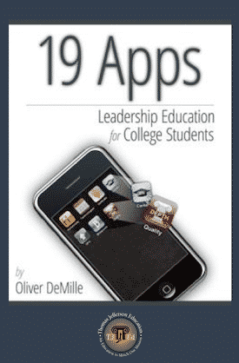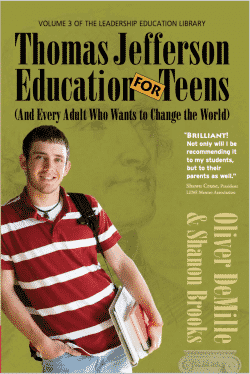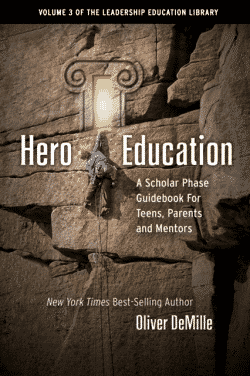Dimensions: 6 in × 9 in × 0.5 in
Weight: 9.6 oz
CHAPTER OUTLINE
Chapter One: Two Towers
Preparing for Leadership * Is Mediocre Education Enough? * We Must Do Better * Genius in our Homes
In the wake of a poignant session of simulations with his students on the morning of the 9/11 attacks, Oliver DeMille considers the path and process of modern education: Are we doing enough to prepare our youth for their generational role of leadership?
Chapter Two: Education Today
Two Types of Teachers * My Children Deserve Better Than This: But This Is All I Know! * Finding A Mentor * Teachers Teach; Students Educate * Problems versus Difficulties * Education For The Twenty-first Century
Almost everyone agrees that American education needs to be “fixed,” but almost nobody agrees on what the remedies should be, or how they should be implemented. With conflicting ideals regarding what education is, and how it is achieved, no hope of a meaningful solution is in sight. The truth is, no matter what other solutions are tried, nothing will make a difference unless students actually study. Some few in history and today actually have, and do. What is their secret? What can parents and teachers do to duplicate historical successes today?
Chapter Three: Three Systems of Schooling
The Coming Renaissance in Education * The Three Types of Education * The Phases of Learning
Today, and throughout much of the history of the world, there have been three primary models of education: The Conveyor Belt System, The Professional System, The Leadership System. Each of these has distinct goals, methods, and outcomes. Which type most significantly contributed to your education? Which is most influential in the development of your children/students? The key to Leadership Education is that it is individualized–not just in content or method, but also in order to optimally support the development of a great soul through the Phases of Learning: Core Phase; Love of Learning; Scholar Phase; Depth Phase. Each of these are essential in the development of the individual, and the lessons and methods of each is distinct. How can we harness the power of doing the right thing at the right time, in the right way? What are the consequences of forcing an unnatural or untimely process on an unprepared heart and mind?
Chapter Four: Mentoring
The George Wythe Method * The 7 Keys of Great Teaching * Apply Lessons to Life
Find a great leader in history, and you will nearly always find two central elements were present in their education: classics and mentors. A great mentor defined. The negative lessons internalized through compulsory learning. The lessons inspired through leadership education. Coming face-to-face with greatness. The 7 Keys of Great Teaching:
- Classics, Not Textbooks
- Mentors, Not Professors
- Inspire, Not Require
- Structure Time, Not Content
- Quality, Not Conformity
- Simplicity, Not Complexity
- You, Not Them
How are the 7 Keys of Great Teaching applied?
Chapter Five: Classics
America’s National Books * Study the Classics * Six Reasons to Study the Classics * Your National Book
What are your companion books in life? A religious text? A television? Learn the powerful implications of a society’s “national book.” Learn also the Six Reasons to Study the Classics:
- Classics Teach us Human Nature.
- The Classics Bring us Face-to-Face with Greatness.
- The Classics Take us to the Frontier to be Conquered.
- The Classics Force us to Think.
- The Classics Connect Us to Stories.
- Our Canon Becomes Our Plot.
As we read the classics, we learn vicariously, and we become with the Hero. All great societies unfold as they explore a frontier; our next frontier lies in discovering ourselves and our missions as we experience the classics. What frontier awaits you?
Chapter Six: Great Teaching
“But How Do I Actually Do It?” * The Five Environments of Mentoring * Teaching Tips by Subject
As noted previously, great education takes place when students set out to educate themselves and follow through. This process is inspired–usually, and best, through mentors and classics. Learn the process of great education from the point of view of the student, and the teacher. This chapter also expounds on The Five Environments of Mentoring:
- Tutorial
- Group Discussion
- Lecture
- Testing
- Coaching
Tips on teaching writing, reading, literature, history, math, science, foreign language, the arts and other subjects.
Chapter Seven: Thomas Jefferson Education in the Public Schools
The Recent History of Educational Reform * The Outcome of Educational Reform * The Two Myths * Putting Teachers First * DO IT
In spite of the lengthy and complex debate over how to “fix” education in America, one thing alone will make all the difference: Putting Teachers First. Trust the process: students will study when they are inspired by great teaching. Education reform through the 80′s and 90′s; the free market and non-traditional solutions: charters, vouchers, private management of public institutions, homeschool, online education. Revisiting the myths about education. How to have a Jefferson-model classroom in a formal institution.
Chapter 8: Thomas Jefferson Education at College
Four Trends Away from Founding Colleges * Back to the Future * Warning One: Pride * Warning Two: Superficiality * Warning Three: The Mundane * Searching Out a College
In 1636 Harvard was founded, starting the Founding Phase of American education. It was followed by Yale in 1701, Princeton in 1746, and William and Mary, Columbia, Brown, Rutgers and Dartmouth, among others, by 1769. These schools trained the Founding Fathers, who established this nation’s Constitution and safeguarded its freedoms. How did they do it? What has changed since then? How do we recapture the process that yields such greatness? The shift to job training and institutionalized models. A return to classical education. Warnings to graduates to stay on the path of their mission. Criteria for a leadership education at the college level.
Chapter 9: Leadership Careers
Your Career Plan * Harvard Skills * Princeton Skills * Wythe Skills * Mentors, Classics and Career Success
Education, not degrees or diplomas, will be the key to success in the coming economy. The three systems of education have different outcomes and career paths. Whatever your desired vocation, leadership education is necessary for personal fulfillment and the future of freedom. Harvard School of Law defines 10 necessary skills for the twenty-first century job market. Princeton lists the goals of undergraduate education. Students define 8 additional skills–not only for career “success,” but for life success and happiness. The combined 30 skills prepare an individual for effective leadership and relationships, to fulfill a life’s mission. Statistics on successful individuals, from the kind of books they read, to the type of marriage they have.
Chapter 10: Statesmanship: Making a Difference in Society
What is a Statesman? * The Need for Statesman * Unknown Statesmen and Stateswomen * Become a Statesman
Jefferson, Adams and Madison before the world knew their names: Were they a breed apart from us, or should we answer the call to become great as well? Statesmanship as more than a political avocation: men and women of virtue, wisdom, diplomacy and courage, who inspire greatness in others and move the cause of liberty. Where are statesmen trained? How? The Five Pillars of Statesmanship: Classics; Mentors; Simulations; Field Experience; God. Jefferson, Madison and Adams were a lot like us ten years before they stepped up to challenge the greatest empire on earth. Where will we be ten years from now?
Epilogue: A New Golden Age
Franklin pondered whether the carving on the president’s chair was a setting or a rising sun. Two centuries later, many experts and intellectuals again wonder at our future. Will the twenty-first century be America’s epilogue, or a New Golden Age? One thing is certain: Tomorrow’s leaders will determine whether the flame of freedom and prosperity lit by American Founders two hundred years ago continues to burn brightly or is extinguished. These leaders are being prepared today. Is the education of our youth up to their potential? Is it equal to the challenges before them? It is time for a new generation to get A Thomas Jefferson Education.
Appendices
- A: 100 Classics
- B: Classics for Children and Youth
- C: Sample Discussion Questions
- D: Where to Find Classics
- E: Recommended Readings
- F: Putting Thomas Jefferson Education to Work (A 10-Step Plan for Getting Started)
Endnotes






Reviews
There are no reviews yet.